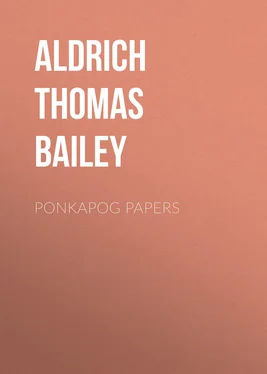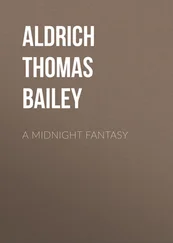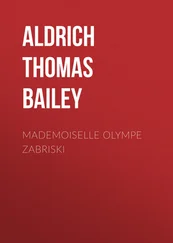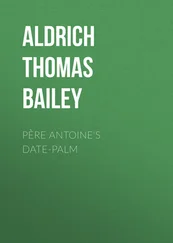Thomas Aldrich - Ponkapog Papers
Здесь есть возможность читать онлайн «Thomas Aldrich - Ponkapog Papers» — ознакомительный отрывок электронной книги совершенно бесплатно, а после прочтения отрывка купить полную версию. В некоторых случаях можно слушать аудио, скачать через торрент в формате fb2 и присутствует краткое содержание. Жанр: foreign_prose, literature_19, foreign_antique, на английском языке. Описание произведения, (предисловие) а так же отзывы посетителей доступны на портале библиотеки ЛибКат.
- Название:Ponkapog Papers
- Автор:
- Жанр:
- Год:неизвестен
- ISBN:нет данных
- Рейтинг книги:4 / 5. Голосов: 1
-
Избранное:Добавить в избранное
- Отзывы:
-
Ваша оценка:
- 80
- 1
- 2
- 3
- 4
- 5
Ponkapog Papers: краткое содержание, описание и аннотация
Предлагаем к чтению аннотацию, описание, краткое содержание или предисловие (зависит от того, что написал сам автор книги «Ponkapog Papers»). Если вы не нашли необходимую информацию о книге — напишите в комментариях, мы постараемся отыскать её.
Ponkapog Papers — читать онлайн ознакомительный отрывок
Ниже представлен текст книги, разбитый по страницам. Система сохранения места последней прочитанной страницы, позволяет с удобством читать онлайн бесплатно книгу «Ponkapog Papers», без необходимости каждый раз заново искать на чём Вы остановились. Поставьте закладку, и сможете в любой момент перейти на страницу, на которой закончили чтение.
Интервал:
Закладка:
Shakespeare, who has done so much to discourage literature by anticipating everybody, puts the whole matter into a nutshell:
But soft! what light through yonder window breaks? It is the east, and Juliet is the sun.
THERE is a phrase spoken by Hamlet which I have seen quoted innumerable times, and never once correctly. Hamlet, addressing Horatio, says:
Give me that man That is not passion’s slave, and I will wear him In my heart’s core, ay, in my heart of heart .
The words italicized are invariably written “heart of hearts”—as if a person possessed that organ in duplicate. Perhaps no one living, with the exception of Sir Henry Irving, is more familiar with the play of Hamlet than my good friend Mr. Bram Stoker, who makes his heart plural on two occasions in his recent novel, “The Mystery of the Sea.” Mrs. Humphry Ward also twice misquotes the passage in “Lady Rose’s Daughter.”
BOOKS that have become classics—books that ave had their day and now get more praise than perusal—always remind me of venerable colonels and majors and captains who, having reached the age limit, find themselves retired upon half pay.
WHETHER or not the fretful porcupine rolls itself into a ball is a subject over which my friend John Burroughs and several brother naturalists have lately become as heated as if the question involved points of theology. Up among the Adirondacks, and in the very heart of the region of porcupines, I happen to have a modest cottage. This retreat is called The Porcupine, and I ought by good rights to know something about the habits of the small animal from which it derives its name. Last winter my dog Buster used to return home on an average of three times a month from an excursion up Mt. Pisgah with his nose stuck full of quills, and he ought to have some concrete ideas on the subject. We two, then, are prepared to testify that the porcupine in its moments of relaxation occasionally contracts itself into what might be taken for a ball by persons not too difficult to please in the matter of spheres. But neither Buster nor I—being unwilling to get into trouble—would like to assert that it is an actual ball. That it is a shape with which one had better not thoughtlessly meddle is a conviction that my friend Buster stands ready to defend against all comers.
WORDSWORTH’S characterization of the woman in one of his poems as “a creature not too bright or good for human nature’s daily food” has always appeared to me too cannibalesque to be poetical. It directly sets one to thinking of the South Sea islanders.
THOUGH Iago was not exactly the kind of person one would select as a superintendent for a Sunday-school, his advice to young Roderigo was wisdom itself—“Put money in thy purse.” Whoever disparages money disparages every step in the progress of the human race. I listened the other day to a sermon in which gold was personified as a sort of glittering devil tempting mortals to their ruin. I had an instant of natural hesitation when the contribution-plate was passed around immediately afterward. Personally, I believe that the possession of gold has ruined fewer men than the lack of it. What noble enterprises have been checked and what fine souls have been blighted in the gloom of poverty the world will never know. “After the love of knowledge,” says Buckle, “there is no one passion which has done so much good to mankind as the love of money.”
DIALECT tempered with slang is an admirable medium of communication between persons who have nothing to say and persons who would not care for anything properly said.
DR. HOLMES had an odd liking for ingenious desk-accessories in the way of pencil-sharpeners, paper-weights, penholders, etc. The latest contrivances in this fashion—probably dropped down to him by the inventor angling for a nibble of commendation—were always making one another’s acquaintance on his study table. He once said to me: “I ‘m waiting for somebody to invent a mucilage-brush that you can’t by any accident put into your inkstand. It would save me frequent moments of humiliation.”
THE deceptive Mr. False and the volatile Mrs. Giddy, who figure in the pages of seventeenth and eighteenth century fiction, are not tolerated in modern novels and plays. Steal the burglar and Palette the artist have ceased to be. A name indicating the quality or occupation of the bearer strikes us as a too transparent device. Yet there are such names in contemporary real life. That of our worthy Adjutant-General Drum may be instanced. Neal and Pray are a pair of deacons who linger in the memory of my boyhood. Sweet the confectioner and Lamb the butcher are individuals with whom I have had dealings. The old-time sign of Ketchum & Cheetam, Brokers, in Wall Street, New York, seems almost too good to be true. But it was once, if it is not now, an actuality.
I HAVE observed that whenever a Boston author dies, New York immediately becomes a great literary centre.
THE possession of unlimited power will make a despot of almost any man. There is a possible Nero in the gentlest human creature that walks.
EVERY living author has a projection of himself, a sort of eidolon, that goes about in near and remote places making friends or enemies for him among persons who never lay eyes upon the writer in the flesh. When he dies, this phantasmal personality fades away, and the author lives only in the impression created by his own literature. It is only then that the world begins to perceive what manner of man the poet, the novelist, or the historian really was. Not until he is dead, and perhaps some long time dead, is it possible for the public to take his exact measure. Up to that point contemporary criticism has either overrated him or underrated him, or ignored him altogether, having been misled by the eidolon, which always plays fantastic tricks with the writer temporarily under its dominion. It invariably represents him as either a greater or a smaller personage than he actually is. Presently the simulacrum works no more spells, good or evil, and the deception is unveiled. The hitherto disregarded author is recognized, and the idol of yesterday, which seemed so important, is taken down from his too large pedestal and carted off to the dumping-ground of inadequate things. To be sure, if he chances to have been not entirely unworthy, and on cool examination is found to possess some appreciable degree of merit, then he is set up on a new slab of appropriate dimensions. The late colossal statue shrinks to a modest bas-relief. On the other hand, some scarcely noticed bust may suddenly become a revered full-length figure. Between the reputation of the author living and the reputation of the same author dead there is ever a wide discrepancy.
A NOT too enchanting glimpse of Tennyson is incidentally given by Charles Brookfield, the English actor, in his “Random Recollections.” Mr. Brookfield’s father was, on one occasion, dining at the Oxford and Cambridge Club with George Venables, Frank Lushington, Alfred Tennyson, and others. “After dinner,” relates the random recollector, “the poet insisted upon putting his feet on the table, tilting back his chair more Americano . There were strangers in the room, and he was expostulated with for his uncouthness, but in vain. ‘Do put down your feet!’ pleaded his host. ‘Why should I?’ retorted Tennyson. ‘I ‘m very comfortable as I am.’ ‘Every one’s staring at you,’ said another. ‘Let ‘em stare,’ replied the poet, placidly. ‘Alfred,’ said my father, ‘people will think you’re Longfellow.’ Down went the feet.” That more Americano of Brookfield the younger is delicious with its fine insular flavor, but the holding up of Longfellow—the soul of gentleness, the prince of courtesy—as a bugaboo of bad manners is simply inimitable. It will take England years and years to detect the full unconscious humor of it.
Читать дальшеИнтервал:
Закладка:
Похожие книги на «Ponkapog Papers»
Представляем Вашему вниманию похожие книги на «Ponkapog Papers» списком для выбора. Мы отобрали схожую по названию и смыслу литературу в надежде предоставить читателям больше вариантов отыскать новые, интересные, ещё непрочитанные произведения.
Обсуждение, отзывы о книге «Ponkapog Papers» и просто собственные мнения читателей. Оставьте ваши комментарии, напишите, что Вы думаете о произведении, его смысле или главных героях. Укажите что конкретно понравилось, а что нет, и почему Вы так считаете.












